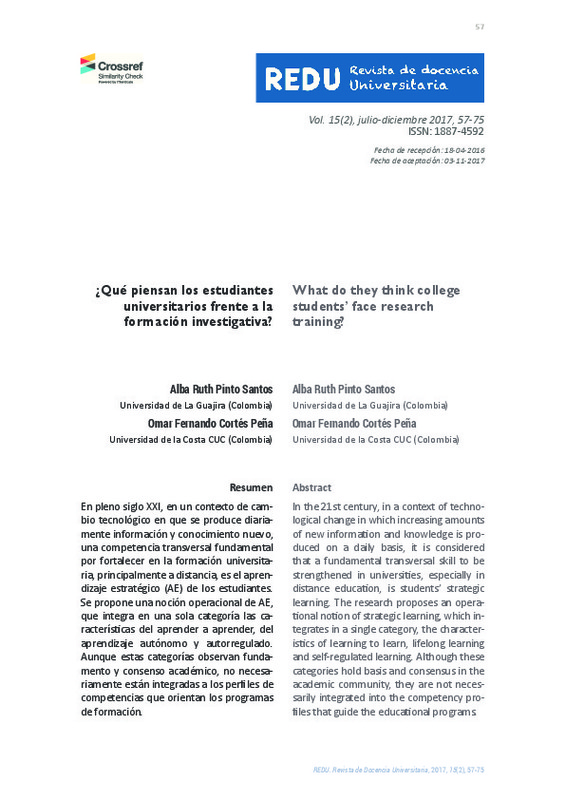JavaScript is disabled for your browser. Some features of this site may not work without it.
Buscar en RiuNet
Listar
Mi cuenta
Estadísticas
Ayuda RiuNet
Admin. UPV
¿Qué piensan los estudiantes universitarios frente a la formación investigativa?
Mostrar el registro sencillo del ítem
Ficheros en el ítem
| dc.contributor.author | Pinto Santos, Alba Ruth
|
es_ES |
| dc.contributor.author | Cortés Peña, Omar Fernando
|
es_ES |
| dc.date.accessioned | 2018-01-03T11:19:40Z | |
| dc.date.available | 2018-01-03T11:19:40Z | |
| dc.date.issued | 2017-12-30 | |
| dc.identifier.issn | 1887-4592 | |
| dc.identifier.uri | http://hdl.handle.net/10251/93866 | |
| dc.description.abstract | [EN] In the 21st century, in a context of techno-logical change in which increasing amounts of new information and knowledge is produced on a daily basis, it is considered that a fundamental transversal skill to be strengthened in universities, especially in distance education, is students’ strategic learning. The research proposes an operational notion of strategic learning, which integrates in a single category, the characteristics of learning to learn, lifelong learning and self-regulated learning. Although these categories hold basis and consensus in the academic community, they are not necessarily integrated into the competency pro-files that guide the educational programs. This research paper presents an analysis of the contribution and impact of the training process on the development of investigative skills in college students. Methodologically holistic research was assumed, operationalized from a triangulated mixed design. The sample was selected randomly, with the participation of 104 students last semester at the Universidad de la Guajira. The techniques and instruments used were the discussion forums and content analysis qualitatively, while quantitatively an attitude scale was applied against research training, with a level of reliability Cronbach’s alpha (α:0.849) and indicators of internal consistency (correlation item - scale) positive and greater than (r: 0.30). The statistical data processing was performed in the SPSS program version 21. From the results of a qualitative nature, it is emphasized that the existence of curricula in the field of research training, is no guarantee of development of investigative skills. In the quantitative order, it highlighted that 90% of students considered the program to which it belongs must reevaluate how research training guides. The contrasting findings identified the need to create spaces for reflection for the development of strategies for educational innovation to enrich the curriculum models, as well as the promotion of extracurricular activities for the development of investigative skills scenarios. | es_ES |
| dc.description.abstract | [ES] Este artículo de investigación presenta un análisis del aporte e impacto que tiene el proceso de formación sobre el desarrollo de competencias investigativas en estudiantes universitarios. Metodológicamente se asumió una investigación holística, operacionalizada a partir de un diseño mixto triangulado. La muestra se seleccionó aleatoriamente, contando con la participación de 104 estudiantes de últimos semestres de la Universidad de la Guajira. Las técnicas e instrumentos empleados fueron los foros de discusión y análisis de contenidos a nivel cualitativo, mientras que a nivel cuantitativo se aplicó una Escala de Actitudes frente a la Formación Investigativa, con un nivel de Confiabilidad Alfa de Cronbach de (α: ,849) e indicadores de consistencia interna (correlación ítem – escala) positivos y superiores a (r: ,30). El procesamiento estadístico de los datos se realizó en el programa SPSS versión 21. A partir de los resultados de orden cualitativo, se resalta que la existencia de contenidos curriculares en el campo de formación en investigación, no es garantía de desarrollo de competencias investigativas. En el orden cuantitativo, se destaca que el 90% de los estudiantes considera que el programa al que pertenece debe revaluar la forma como orienta la formación investigativa. La contrastación de los hallazgos permitió identificar la necesidad de generar espacios de reflexión para el desarrollo de estrategias de innovación educativa que permita enriquecer los modelos curriculares, así como la promoción de los escenarios extracurriculares para el desarrollo de las competencias investigativas. | es_ES |
| dc.language | Español | es_ES |
| dc.publisher | Universitat Politècnica de València | |
| dc.relation.ispartof | REDU. Revista de Docencia Universitaria | |
| dc.rights | Reconocimiento - No comercial - Sin obra derivada (by-nc-nd) | es_ES |
| dc.subject | Competencias investigativas | es_ES |
| dc.subject | Formación profesional | es_ES |
| dc.subject | Educación superior | es_ES |
| dc.subject | Actividad científico-investigativa | es_ES |
| dc.subject | Investigative skills | es_ES |
| dc.subject | Research training | es_ES |
| dc.subject | Higher education | es_ES |
| dc.subject | Scientific investigative activity | es_ES |
| dc.title | ¿Qué piensan los estudiantes universitarios frente a la formación investigativa? | es_ES |
| dc.title.alternative | What do they think college students’ face research training? | es_ES |
| dc.type | Artículo | es_ES |
| dc.date.updated | 2018-01-03T09:23:50Z | |
| dc.identifier.doi | 10.4995/redu.2017.6059 | |
| dc.rights.accessRights | Abierto | es_ES |
| dc.description.bibliographicCitation | Pinto Santos, AR.; Cortés Peña, OF. (2017). ¿Qué piensan los estudiantes universitarios frente a la formación investigativa?. REDU. Revista de Docencia Universitaria. 15(2):57-76. https://doi.org/10.4995/redu.2017.6059 | es_ES |
| dc.description.accrualMethod | SWORD | es_ES |
| dc.relation.publisherversion | https://doi.org/10.4995/redu.2017.6059 | es_ES |
| dc.description.upvformatpinicio | 57 | es_ES |
| dc.description.upvformatpfin | 76 | es_ES |
| dc.type.version | info:eu-repo/semantics/publishedVersion | es_ES |
| dc.description.volume | 15 | |
| dc.description.issue | 2 |








